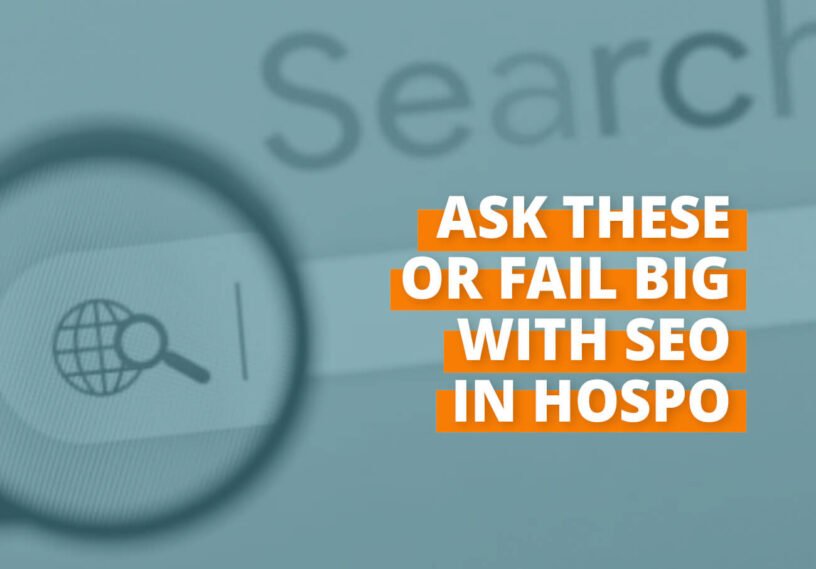In the competitive world of hospitality, SEO can become our added ‘secret sauce’ to our marketing. It could help draw more eyeballs to our business presence online, thus bringing us customers. But before diving into SEO, we need to focus on the basics and have a clear plan.
Many hospo business owners already received the same email I did—that “SEO boosting email from a random person in India.” We are vaguely familiar with SEO, we know its importance but are unsure how to go about it.
The internet has us focusing on flashy tricks and hacks and the importance of citations and backlinks. Without understanding the basics, SEO help is meaningless.
In my What is SEO -The Simplest Explanation article, I wrote about the basics of SEO. Today, with this guide, I will delve into the basics again from another angle. I will talk about the most important questions a hospitality or F&B business owner should ask to avoid mistakes and ensure their SEO is built on a solid foundation. Whether we do our own SEO or have an SEO pro doing it for us.
Common SEO Mistakes Hospitality Owners Make
I have seen mistakes in hospitality where owners do not even have a concrete strategy or when they do have one, do not know they can have multiple strategies. Further, they do not know their keywords or have their target audiences defined. The biggest mistake, however, is not having a well-defined strategy from the start. Let’s change that.
Questions Every Hospitality Business Needs to Answer Before Starting SEO
- What are the 5-10 keywords and key phrases your business wants to rank for?
- Where exactly do you want to rank with your business?
- What products/services do you want to rank with?
- Who do you want to rank for?
- Are you using those expressions everywhere in your online presence?
Below, I elaborated on each, gave an explanation and actionable advice that is easy to understand.
1. What Are the 5-10 Keywords and Key Phrases Your Business Wants to Rank For?
Before you begin any SEO work, you must identify the keywords and phrases that best suit your business and what customers might search for. These words should reflect your unique offerings and location.
Examples:
Keywords:
- steak restaurant,
- boutique hotel,
- artisan bakery,
- event catering.
Key phrases:
- recommended steak restaurant in Christchurch,
- best boutique hotel near Christchurch airport,
- best artisan bakery in Riccarton,
- corporate event catering around Auckland.
Actionable Tip:
Use free tools like Google Keyword Planner, Answer the Public, Google Search, and Google Trends to identify high-ranking keywords relevant to your business. Read my article on how to do keyword research for a website’s SEO.
2. Where Exactly Do You Want to Rank?
Knowing where you want to rank geographically helps narrow down your SEO strategy. Is your focus on local customers in Christchurch, tourists visiting Canterbury or both? Being specific about your target location enables you to dominate local search.
Examples:
- District: Christchurch Central.
- City: Christchurch.
- Region: Canterbury.
- Country: New Zealand.
Actionable Tip:
Include location names in your keyphrases (see the examples above in point no.1).
Use these keyphrases with your locations in your website H1-H6 titles, descriptions, and general content to signal to search engines where your business operates.
3. What Products/Services Do You Want to Rank With?
SEO is not just about your business in general; it’s also about the specific products or services you offer. Create a list of what you want to be known for, whether it’s your hotel rooms, restaurant menu, event catering or spa services.
Examples:
- Craft cocktails.
- Fine dining with local ingredients.
- Corporate event catering.
- Luxury suites with ocean views.
Actionable Tip:
With all the information in mind, you have read here so far, create dedicated pages on your website for each product or service and optimise them with relevant keywords. Pay special attention to writing the H1 title (which should be strictly only one per page), and the H2-H3 sub-titles.
4. Who Do You Want to Rank For?
Your SEO should target the right audience. Consider the types of customers you want to attract. Are they tourists looking for a weekend getaway? Business people during lunchtime? Or perhaps locals who love to dine out after work? Defining your audience will shape your content and keyword selection.
Examples:
- At lunchtime, corporate employees in the city centre.
- On the weekend, families from across the city.
- At dinnertime, locals who are located within a 2km radius of your establishment.
- At breakfast, people who are heading to work from city-wide.
- During the day, people around the city who want to order takeaways.
Bonus tip! You can define multiple audiences based on the nature of your business.
Consider these in your posts, general communication, online descriptions and paid ads.
Actionable Tip:
Use audience-specific keywords like “best family-friendly cafe” or “top brunch spots for corporates in Christchurch” or “catering for company’s team building events around Canterbury” or “dog-friendly bistro in Papanui” or “restaurant with outdoor garden seats with kids play area” or “brunch with ocean view for groups in Sumner”.
5. Are You Using Those Expressions Everywhere in Your Online Presence?
Consistency is key in SEO. Once you’ve identified your keywords and key phrases, use them across your website, social media, and online listing descriptions. This builds relevance and ensures search engines can connect all your content to your business.
Examples:
Include keywords in your blog posts, service pages, and image descriptions.
Use key phrases in your Google Business Profile and social media bios.
Add location-specific keywords to your business descriptions on online platforms like TripAdvisor or Bookingdotcom.
Actionable Tip:
Review your online presence and ensure these key phrases are visible on every platform your business is listed.
6. How Strong Is Your Google Business Profile?
A well-optimised Google Business Profile can help your business stand out in local searches. This profile is significant for hospitality businesses that rely on local traffic.
Examples:
Ensure your business details are accurate online, not just on your Google Business Profile (opening hours, address, correct links, social links, special hours, etc.).
Regularly post photos of your venue, food, or services.
Encourage happy customers to leave reviews, which can boost your local ranking.
Actionable Tip:
Follow my free Google Business Profile Optimisation Checklist. No email address needed. Download your free copy on this page.
Conclusion
SEO is crucial for hospitality businesses that want to attract new customers. But it is only one stone in your solid foundations. Couple that with a user-friendly website, an optimised Google Business Profile and paid local ads on Google Ads and Meta; your marketing is set. Before diving into SEO, though, ensure you have answered these key questions to ensure your SEO strategy is targeted, focused, and effective right from the start.
Remember, SEO is a long-term investment, but with a clear strategy, you can start seeing actual results. I hope I have spiced up your SEO knowledge a bit.
Follow this blog as I share hands-on marketing tips with readers that I find helpful.
Thank you for reading my post.
I am Shopi.
I provide no B.S. marketing & design for Hospitality Businesses.




